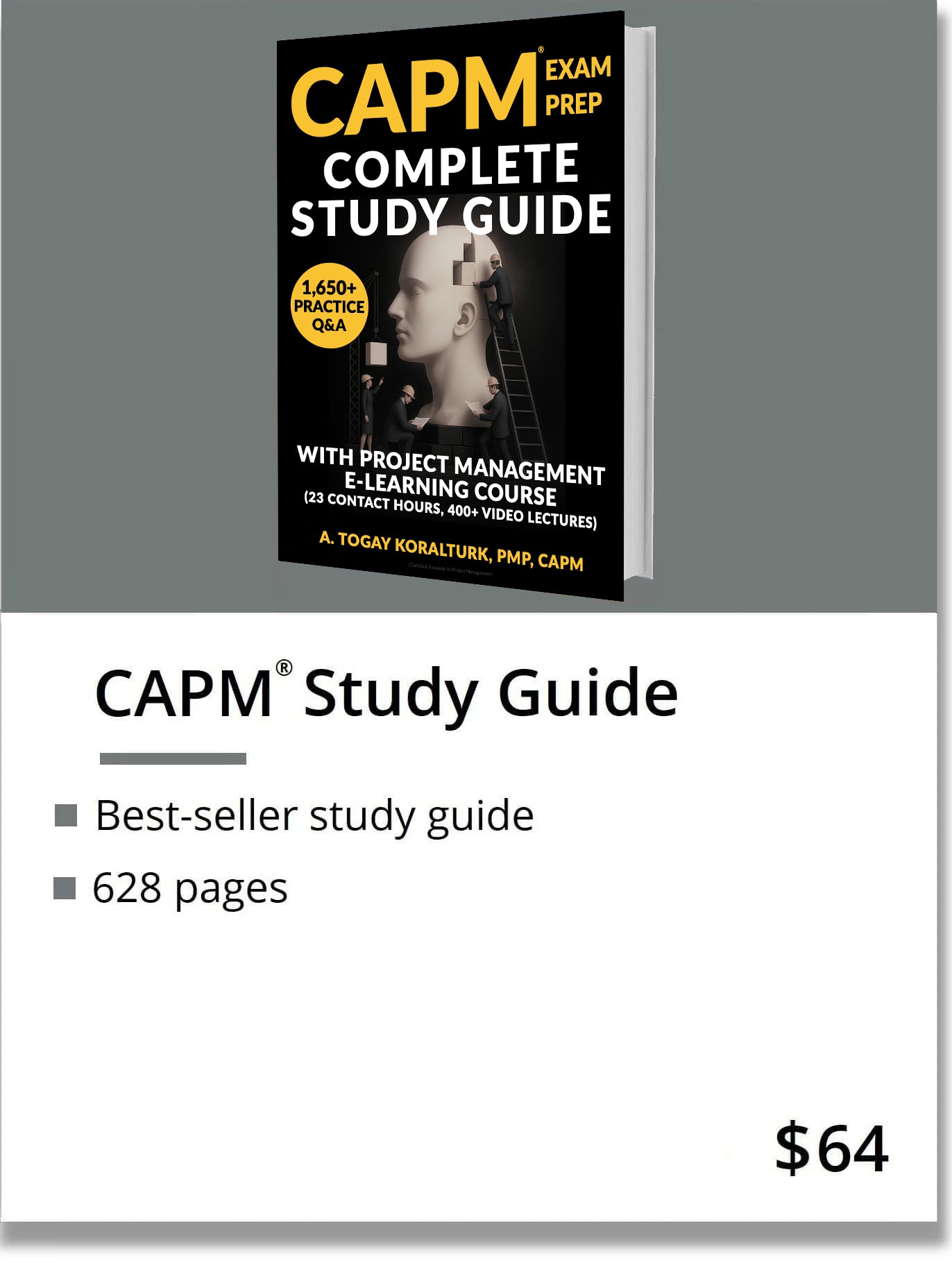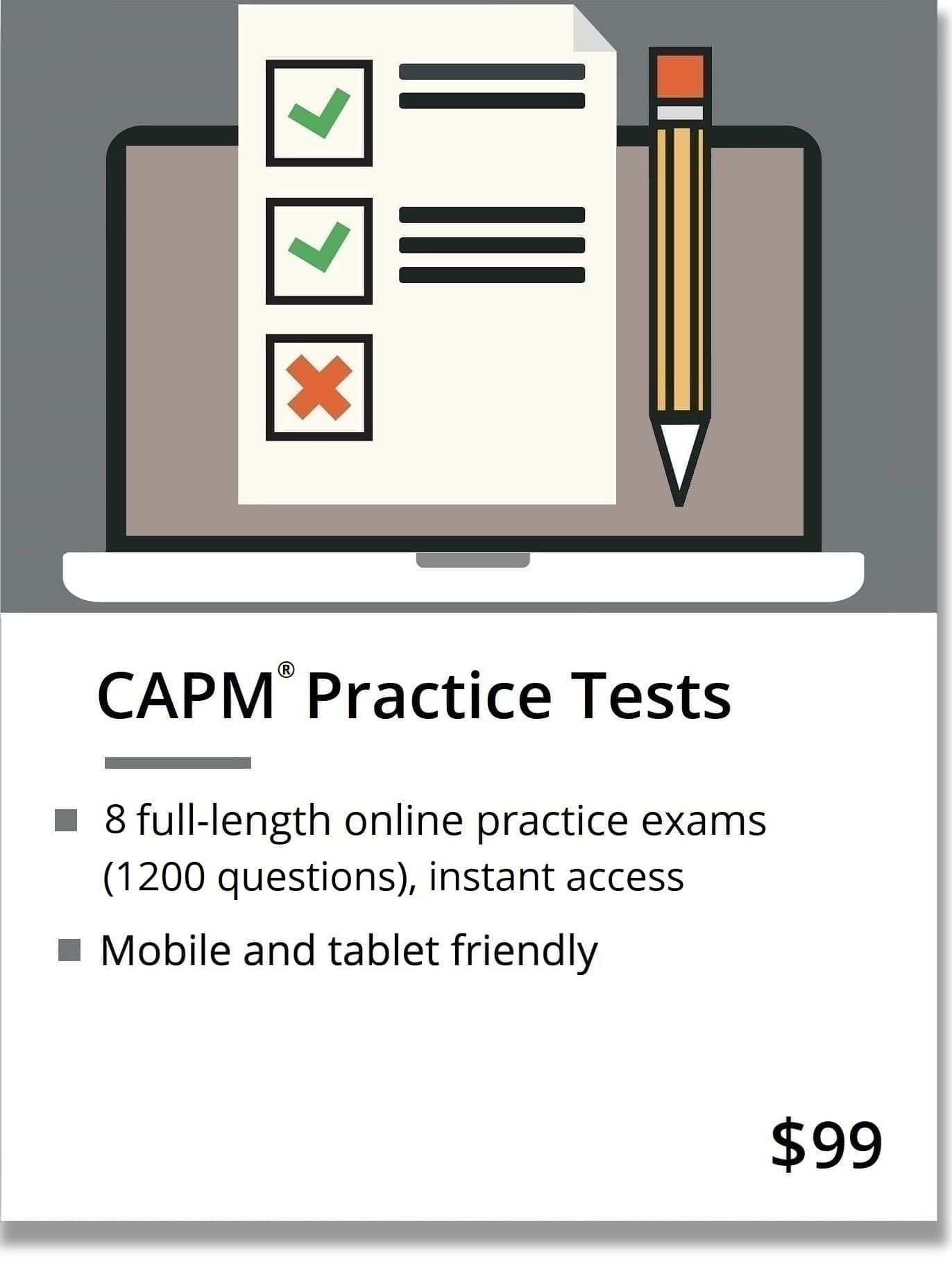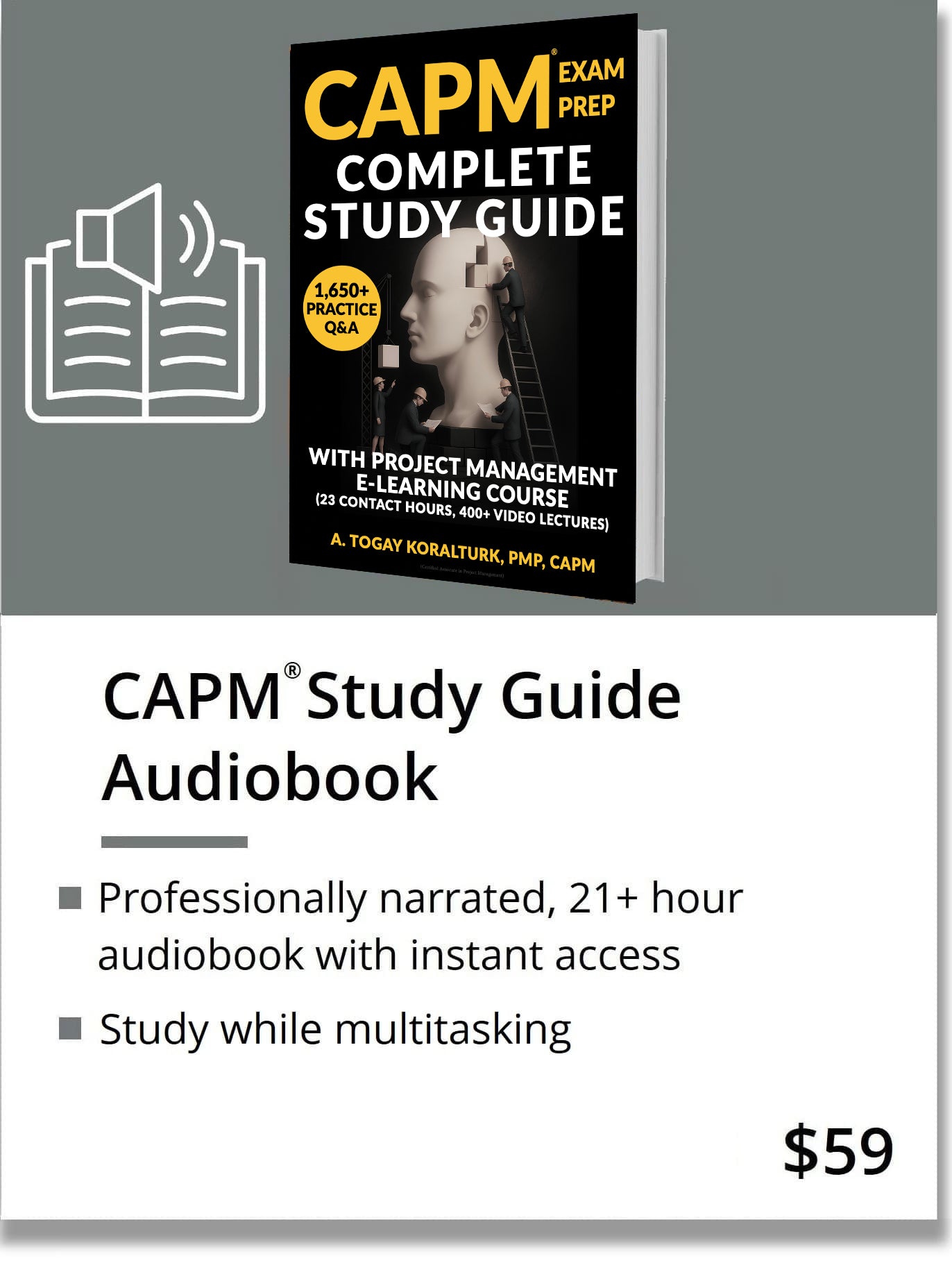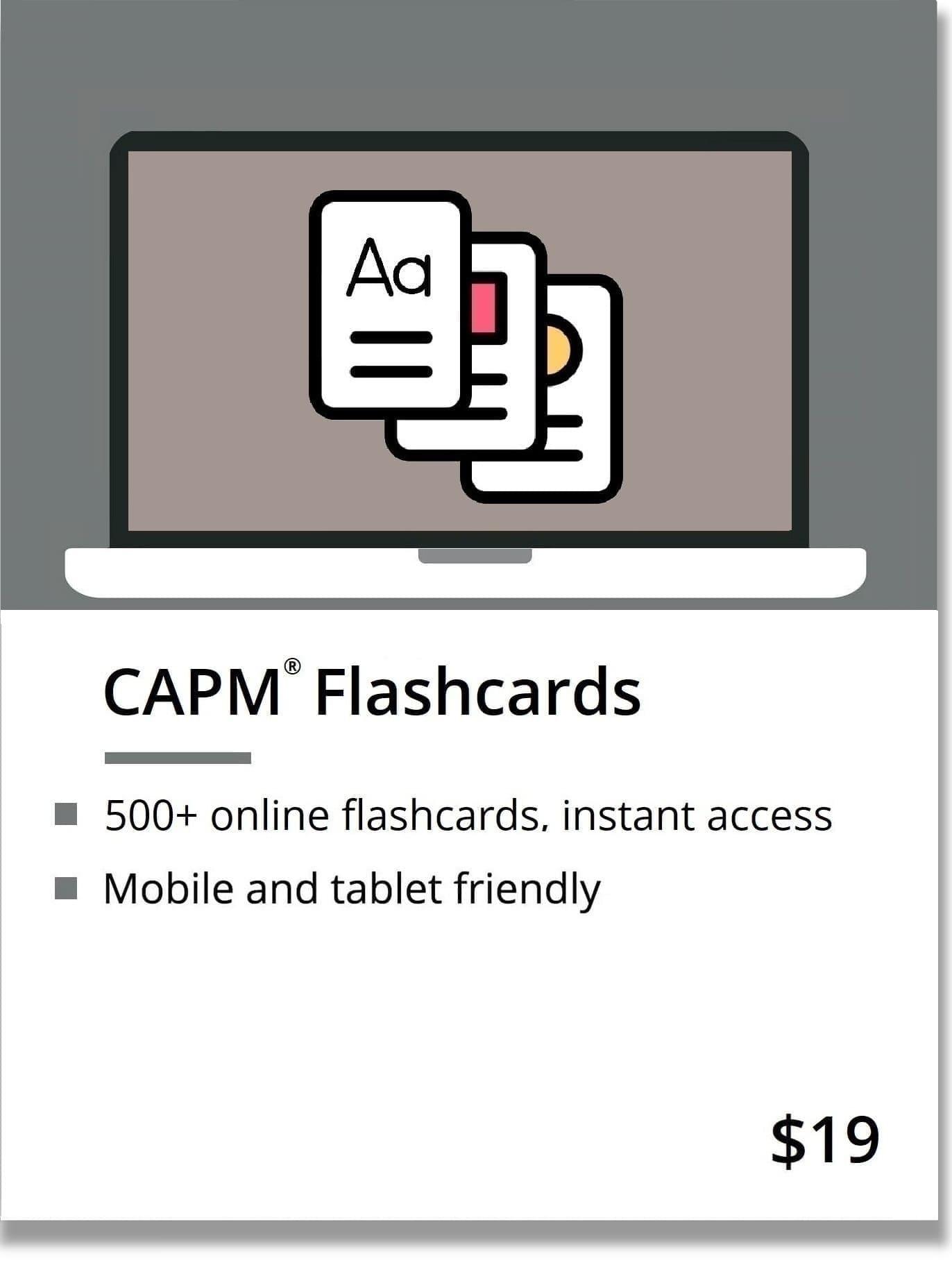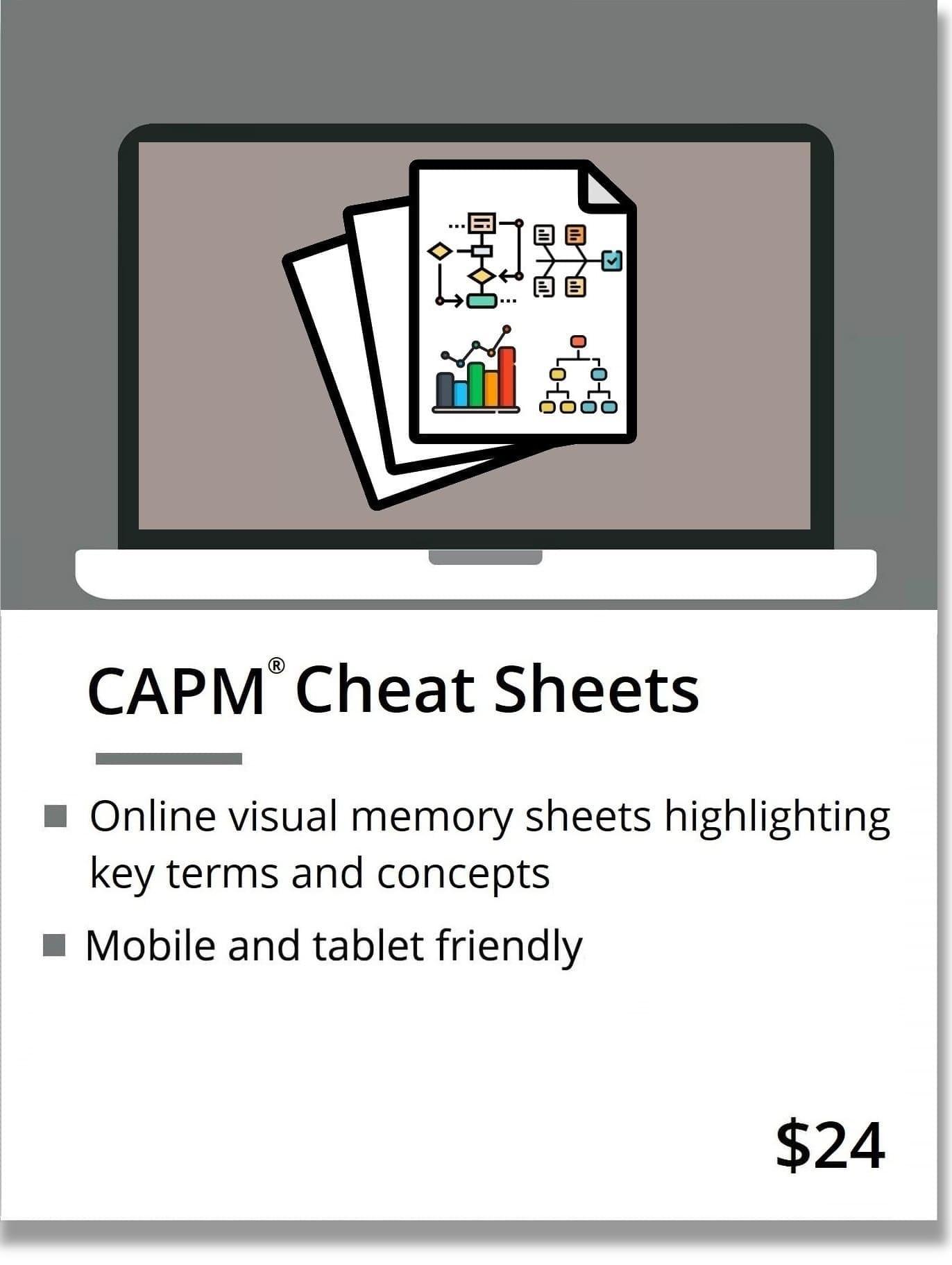
CAPM® Fast Forward: A Crash Review Course
Intended for candidates who have initiated their Certified Associate in Project Management (CAPM) exam studies but need a comprehensive review, this cram course identifies weak spots, reinforces knowledge, and provides six full-length practice exams (900 questions) and 300+ checkpoint questions to ensure passing the exam on the first try.
Features:
- 400+ engaging modules.
- Grants 23 contact hours upon completion.
- Includes six full-length, realistic practice exams (900 questions) and over 300 checkpoint questions—totaling more than 1,200 questions.
- Includes almost 1,000 ultimate tips for exam success.
-
03:40 Chapter 1: Introduction
Chapter 1: Introduction
01:57 CAPM Exam Structure
CAPM Exam Structure
18:54 What are CAPM Exam Questions Like?
What are CAPM Exam Questions Like?
00:52 An Overview of CAPM Exam Policies and Procedures
An Overview of CAPM Exam Policies and Procedures
00:57 Eligibility Requirements to Take the CAPM Exam
Eligibility Requirements to Take the CAPM Exam
01:04 Exam Fees
Exam Fees
01:10 Where to Take the Exam?
Where to Take the Exam?
02:15 How to Apply for the Exam?
How to Apply for the Exam?
00:54 PMI® Audits
PMI® Audits
-
01:09 Chapter 2: Introduction
Chapter 2: Introduction
03:45 What is a Project?
What is a Project?
03:27 Projects and Operations
Projects and Operations
04:25 The Ultimate Project Goal: Creating Value
The Ultimate Project Goal: Creating Value
02:28 What is Project Management?
What is Project Management?
06:09 The Role of the Project Team and Project Team Management
The Role of the Project Team and Project Team Management
-
01:40 Chapter 3: Introduction
Chapter 3: Introduction
01:27 Projects, Programs, and Portfolios
Projects, Programs, and Portfolios
02:22 Program Management
Program Management
04:46 Program Manager
Program Manager
02:35 Portfolio Management
Portfolio Management
04:28 Portfolio Manager
Portfolio Manager
01:24 Product Management
Product Management
04:54 Product Manager
Product Manager
07:26 Navigating Business Needs: Business Analysis and the Role of the Business Analyst
Navigating Business Needs: Business Analysis and the Role of the Business Analyst
01:02 The Project Environment
The Project Environment
02:25 Internal Environment
Internal Environment
03:13 External Environment
External Environment
03:11 Organizational Governance and Project Governance Systems
Organizational Governance and Project Governance Systems
00:44 Organizational Structure Types
Organizational Structure Types
04:27 Functional (Centralized) Organizational Structure
Functional (Centralized) Organizational Structure
03:30 Project-Oriented (Projectized) Organizational Structure
Project-Oriented (Projectized) Organizational Structure
05:45 Matrix Organizational Structure
Matrix Organizational Structure
02:34 Hybrid Organizational Structure
Hybrid Organizational Structure
06:19 Project Management Office (PMO)
Project Management Office (PMO)
04:56 Organizational Process Assets (OPAs)
Organizational Process Assets (OPAs)
02:36 Systems Thinking
Systems Thinking
-
00:48 Chapter 4: Introduction
Chapter 4: Introduction
03:22 SWOT Analysis
SWOT Analysis
01:04 Economic Measures for Project Selection
Economic Measures for Project Selection
03:27 Present Value (PV) and Future Value (FV)
Present Value (PV) and Future Value (FV)
03:16 Net Present Value (NPV)
Net Present Value (NPV)
03:12 Internal Rate of Return (IRR)
Internal Rate of Return (IRR)
02:38 Payback Period
Payback Period
02:34 Return on Investment (ROI)
Return on Investment (ROI)
03:38 Cost-Benefit Analysis
Cost-Benefit Analysis
04:37 Important Financial and Accounting Terms to Know
Important Financial and Accounting Terms to Know
-
00:53 Chapter 5: Introduction
Chapter 5: Introduction
02:42 Project Life Cycle
Project Life Cycle
01:20 Development Approach
Development Approach
05:38 Predictive (Waterfall) Approach
Predictive (Waterfall) Approach
06:39 Iterative Approach
Iterative Approach
05:53 Incremental Approach
Incremental Approach
05:04 Agile Manifesto
Agile Manifesto
09:13 Agile (Adaptive) Approach
Agile (Adaptive) Approach
03:49 Early and Continuous Delivery of Value
Early and Continuous Delivery of Value
02:05 Iteration-Based Agile
Iteration-Based Agile
02:29 Flow-Based Agile
Flow-Based Agile
04:09 Hybrid Approach
Hybrid Approach
02:42 Delivery Cadence
Delivery Cadence
04:49 Key Factors to Consider When Selecting a Development Approach
Key Factors to Consider When Selecting a Development Approach
02:31 How Project Development Approaches Influence Business Analysis Processes
How Project Development Approaches Influence Business Analysis Processes
-
01:40 Chapter 6: Introduction
Chapter 6: Introduction
04:58 Business Case
Business Case
01:53 Business Model Canvas
Business Model Canvas
06:40 Project Charter
Project Charter
02:34 Project Constraints
Project Constraints
02:48 Project Assumptions
Project Assumptions
02:49 Project Vision/Product Vision
Project Vision/Product Vision
02:56 Roadmap/Product Roadmap
Roadmap/Product Roadmap
03:40 Kickoff Meeting
Kickoff Meeting
-
02:04 Chapter 7: Introduction
Chapter 7: Introduction
04:23 Identify Stakeholders
Identify Stakeholders
05:23 Analyze and Prioritize Stakeholders
Analyze and Prioritize Stakeholders
02:30 Salience Model
Salience Model
02:43 Power/Interest Grid
Power/Interest Grid
02:10 Stakeholder Cube
Stakeholder Cube
04:26 Plan Stakeholder Engagement
Plan Stakeholder Engagement
02:38 Engaging Stakeholders
Engaging Stakeholders
08:29 Communication Types and Methods
Communication Types and Methods
06:03 Monitor Stakeholder Engagement
Monitor Stakeholder Engagement
04:14 Top-Level Engagement: The Role of the Project Sponsor
Top-Level Engagement: The Role of the Project Sponsor
-
01:12 Chapter 8: Introduction
Chapter 8: Introduction
05:17 Team Development
Team Development
02:49 Team Charter/Team Agreement
Team Charter/Team Agreement
05:49 Tuckman Ladder
Tuckman Ladder
01:32 Effective Leadership & Interpersonal Skills
Effective Leadership & Interpersonal Skills
07:19 Leadership Styles
Leadership Styles
01:16 Situational Leadership II
Situational Leadership II
01:15 Oscar Model
Oscar Model
03:18 Powers of the Project Manager
Powers of the Project Manager
02:03 Motivation
Motivation
03:29 Maslow’s Hierarchy of Needs
Maslow’s Hierarchy of Needs
03:29 Hygiene and Motivational Factors
Hygiene and Motivational Factors
01:02 Intrinsic Versus Extrinsic Motivation
Intrinsic Versus Extrinsic Motivation
01:04 Theory of Needs
Theory of Needs
04:20 Theory X, Theory Y, and Theory Z
Theory X, Theory Y, and Theory Z
01:02 Expectancy Theory
Expectancy Theory
03:30 Decision-Making
Decision-Making
04:03 Emotional Intelligence
Emotional Intelligence
02:32 Conflict Management
Conflict Management
01:19 Factors to Consider When Managing Conflict
Factors to Consider When Managing Conflict
01:57 How to Resolve Conflict
How to Resolve Conflict
06:32 Conflict Resolution Techniques
Conflict Resolution Techniques
00:55 Critical Thinking
Critical Thinking
-
02:31 Chapter 9: Introduction
Chapter 9: Introduction
04:42 Scrum
Scrum
05:32 Product Owner
Product Owner
01:38 Product Owners vs Product Managers vs Project Managers
Product Owners vs Product Managers vs Project Managers
04:28 Scrum Master
Scrum Master
06:13 Developers (Development Team)
Developers (Development Team)
00:33 Scrum Activities and Artifacts
Scrum Activities and Artifacts
03:37 Product Backlog
Product Backlog
03:46 User Stories
User Stories
02:52 Product Backlog Grooming
Product Backlog Grooming
02:14 Definition of Ready
Definition of Ready
03:04 Definition of Done
Definition of Done
00:48 Scrum Events
Scrum Events
03:57 Sprint Planning (Iteration Planning)
Sprint Planning (Iteration Planning)
03:53 Sprint Execution (Iteration Execution)
Sprint Execution (Iteration Execution)
03:07 Daily Scrum (Daily Standup)
Daily Scrum (Daily Standup)
03:26 Sprint Review (Iteration Review)
Sprint Review (Iteration Review)
03:50 Sprint Retrospective (Iteration Retrospective)
Sprint Retrospective (Iteration Retrospective)
03:32 Scrum of Scrums
Scrum of Scrums
04:26 Kanban
Kanban
03:32 Scrumban
Scrumban
03:34 Lean
Lean
05:10 Extreme Programming (XP)
Extreme Programming (XP)
00:45 Crystal Methods
Crystal Methods
01:23 Feature-Driven Development
Feature-Driven Development
00:57 Dynamic Systems Development Method
Dynamic Systems Development Method
01:00 Scaled Agile Framework (SAFe)
Scaled Agile Framework (SAFe)
-
02:47 Chapter 10: Introduction
Chapter 10: Introduction
09:17 Project Management Plan
Project Management Plan
03:43 Integration Management: A Core Function of the Project Manager
Integration Management: A Core Function of the Project Manager
07:40 Process-Based Approach to Project Management: PMI’s Process Groups Model
Process-Based Approach to Project Management: PMI’s Process Groups Model
02:29 Scope Planning
Scope Planning
03:06 Scope Management Plan
Scope Management Plan
02:50 Requirements Management Plan
Requirements Management Plan
04:35 Eliciting Requirements
Eliciting Requirements
02:29 Use Case
Use Case
02:45 Gulf of Execution and Evaluation
Gulf of Execution and Evaluation
02:05 Context Diagram
Context Diagram
02:38 Personas
Personas
02:59 Impact Mapping
Impact Mapping
02:09 Affinity Diagram
Affinity Diagram
02:06 Mind Map
Mind Map
02:59 Requirements Traceability Matrix
Requirements Traceability Matrix
02:45 Prioritization Matrix
Prioritization Matrix
03:02 MoSCoW Method
MoSCoW Method
01:23 Defining and Decomposing Scope
Defining and Decomposing Scope
05:51 Work Breakdown Structure (WBS)
Work Breakdown Structure (WBS)
01:18 Structuring the WBS
Structuring the WBS
02:30 WBS Dictionary
WBS Dictionary
05:24 Scope Statement
Scope Statement
02:34 Scope Baseline
Scope Baseline
00:38 Product Breakdown Structure (PBS)
Product Breakdown Structure (PBS)
00:51 Scope Decomposition for Agile Projects
Scope Decomposition for Agile Projects
02:42 Story Mapping
Story Mapping
00:49 Schedule Management: An Introduction
Schedule Management: An Introduction
04:01 Plan Schedule Management
Plan Schedule Management
05:35 Defining Activities
Defining Activities
05:43 Sequencing Activities
Sequencing Activities
02:41 Leads and Lags
Leads and Lags
03:47 Schedule Network Diagram
Schedule Network Diagram
04:11 Determining the Activity Dependencies
Determining the Activity Dependencies
02:46 Sequencing Activities: Where to Start
Sequencing Activities: Where to Start
00:58 Estimating Activity Durations
Estimating Activity Durations
06:22 Factors to Consider When Estimating Activity Durations
Factors to Consider When Estimating Activity Durations
00:55 Accuracy and Precision
Accuracy and Precision
01:25 Effort vs Duration vs Elapsed Time
Effort vs Duration vs Elapsed Time
02:52 Types of Estimation Techniques
Types of Estimation Techniques
03:56 Analogous Estimating (Top-Down Estimating)
Analogous Estimating (Top-Down Estimating)
02:53 Parametric Estimating
Parametric Estimating
04:50 Three-Point Estimating (Multipoint Estimating)
Three-Point Estimating (Multipoint Estimating)
03:39 Bottom-Up Estimating
Bottom-Up Estimating
04:42 Allocating Reserves to the Estimates
Allocating Reserves to the Estimates
02:16 Estimating Activity Durations: Where to Start
Estimating Activity Durations: Where to Start
01:37 Developing the Project Schedule
Developing the Project Schedule
03:16 Critical Path Method (CPM)
Critical Path Method (CPM)
02:51 Early Start/Finish and Late Start/Finish Dates
Early Start/Finish and Late Start/Finish Dates
04:02 Total Float
Total Float
02:48 Free Float
Free Float
03:47 Negative Total Float and Longest Path
Negative Total Float and Longest Path
00:55 Resource Optimization
Resource Optimization
03:54 Resource Leveling
Resource Leveling
03:18 Resource Smoothing
Resource Smoothing
03:51 Fast-Tracking
Fast-Tracking
03:46 Crashing
Crashing
02:27 Compressing a Single Critical Path vs Parallel Critical Paths
Compressing a Single Critical Path vs Parallel Critical Paths
02:57 Analyzing Schedule, Cost, and Risk Tradeoffs When Compressing the Schedule
Analyzing Schedule, Cost, and Risk Tradeoffs When Compressing the Schedule
02:40 What-If Scenario Analysis
What-If Scenario Analysis
03:01 Monte Carlo Analysis
Monte Carlo Analysis
07:15 Developing the Project Schedule: A Summary
Developing the Project Schedule: A Summary
03:53 Cost Management Planning
Cost Management Planning
01:02 Cost Estimation Techniques
Cost Estimation Techniques
06:38 Determining Budget
Determining Budget
02:09 Estimation in Agile Projects
Estimation in Agile Projects
06:02 Agile Estimation Units
Agile Estimation Units
03:11 Wideband Delphi
Wideband Delphi
03:38 Planning Poker
Planning Poker
04:23 Affinity Estimating
Affinity Estimating
02:51 Forecasting Schedule and Budget in Agile Projects
Forecasting Schedule and Budget in Agile Projects
04:07 Velocity
Velocity
05:13 Cycle Time and Throughput
Cycle Time and Throughput
04:26 Agile Release Planning
Agile Release Planning
04:16 Planning Project Team Composition and Structure
Planning Project Team Composition and Structure
04:04 Planning for Distributed Project Teams
Planning for Distributed Project Teams
03:23 Resource Management Plan
Resource Management Plan
02:18 Resource Breakdown Structure (RBS)
Resource Breakdown Structure (RBS)
02:14 Organizational Breakdown Structure (OBS)
Organizational Breakdown Structure (OBS)
03:02 Responsibility Assignment Matrix (RAM)
Responsibility Assignment Matrix (RAM)
06:55 Quality Planning
Quality Planning
05:18 Cost of Quality (CoQ)
Cost of Quality (CoQ)
02:19 Cost of Change
Cost of Change
03:35 Quality Management Plan
Quality Management Plan
01:11 Procurement Planning
Procurement Planning
04:27 Centralized and Decentralized Purchasing
Centralized and Decentralized Purchasing
03:06 Procurement Management Plan
Procurement Management Plan
02:58 Make-or-Buy Analysis
Make-or-Buy Analysis
04:16 Non-Competitive Forms of Procurement
Non-Competitive Forms of Procurement
04:47 Statement of Work (SOW)
Statement of Work (SOW)
01:21 Communications Planning
Communications Planning
05:10 Communication Models
Communication Models
06:12 Considerations in Achieving Effective Communications
Considerations in Achieving Effective Communications
03:55 Who Needs To Be Communicated With?
Who Needs To Be Communicated With?
01:48 What Needs to be Communicated?
What Needs to be Communicated?
01:48 Where Is The Information That Will Be Communicated?
Where Is The Information That Will Be Communicated?
02:24 When is the Communication Needed?
When is the Communication Needed?
02:05 Why is this Communication Essential?
Why is this Communication Essential?
03:36 Communication Technologies
Communication Technologies
04:48 Communications Management Plan
Communications Management Plan
04:03 Planning for Changes
Planning for Changes
04:19 Creating Effective Metrics
Creating Effective Metrics
02:55 Incorporating Social and Environmental Responsibility into Project Planning
Incorporating Social and Environmental Responsibility into Project Planning
-
01:13 Chapter 11: Introduction
Chapter 11: Introduction
04:38 Establishing and Improving Project Processes
Establishing and Improving Project Processes
02:37 Maintaining Effective Communications and Stakeholder Engagement
Maintaining Effective Communications and Stakeholder Engagement
01:06 Working with Procurements
Working with Procurements
01:59 Contracts: An Overview
Contracts: An Overview
01:24 Essential Elements of an Enforceable Contract
Essential Elements of an Enforceable Contract
06:00 Terms and Conditions of a Contract
Terms and Conditions of a Contract
00:40 Contract Types
Contract Types
04:45 Fixed-Price (FP) Contracts
Fixed-Price (FP) Contracts
02:28 Purchase Order (PO)
Purchase Order (PO)
02:58 Firm-Fixed-Price (FFP) Contracts
Firm-Fixed-Price (FFP) Contracts
03:46 Fixed-Price-Incentive-Fee (FPIF) Contracts
Fixed-Price-Incentive-Fee (FPIF) Contracts
03:19 Fixed-Price-with-Economic-Price-Adjustment (FP-EPA) Contracts
Fixed-Price-with-Economic-Price-Adjustment (FP-EPA) Contracts
06:17 Cost-Reimbursable (CR) Contracts
Cost-Reimbursable (CR) Contracts
02:30 Cost-Plus-Fixed-Fee (CPFF) Contracts
Cost-Plus-Fixed-Fee (CPFF) Contracts
03:15 Cost-Plus-Incenctive-Fee (CPIF) Contracts
Cost-Plus-Incenctive-Fee (CPIF) Contracts
03:43 Cost-Plus-Award-Fee (CPAF) Contracts
Cost-Plus-Award-Fee (CPAF) Contracts
05:05 Time-and-Material (T&M) Contracts
Time-and-Material (T&M) Contracts
03:14 Indefinite Delivery/Indefinite Quantity (IDIQ) Contracts
Indefinite Delivery/Indefinite Quantity (IDIQ) Contracts
05:24 Awarding Contracts
Awarding Contracts
07:12 Controlling Procurements
Controlling Procurements
01:57 Managing Change
Managing Change
08:36 Managing Change in Plan-Driven Projects
Managing Change in Plan-Driven Projects
04:07 Managing Change in Change-Driven Projects
Managing Change in Change-Driven Projects
00:44 Change Models
Change Models
00:38 ADKAR Model
ADKAR Model
00:55 The 8-Step Process for Leading Change
The 8-Step Process for Leading Change
01:47 Virginia Satir Change Model
Virginia Satir Change Model
00:56 Transition Model
Transition Model
03:31 Knowledge Management
Knowledge Management
03:24 Effective Knowledge Sharing
Effective Knowledge Sharing
03:55 Lessons Learned
Lessons Learned
-
01:25 Chapter 12: Introduction
Chapter 12: Introduction
03:25 Effective Requirements Management
Effective Requirements Management
06:51 Managing Quality/Quality Assurance (QA)
Managing Quality/Quality Assurance (QA)
04:25 Quality Control (QC)
Quality Control (QC)
03:16 Cause-and-Effect Diagram
Cause-and-Effect Diagram
02:11 Checklists
Checklists
02:01 Check Sheets
Check Sheets
06:56 Control Charts
Control Charts
02:16 Flowcharts
Flowcharts
02:50 Histograms
Histograms
03:49 Pareto Charts
Pareto Charts
03:58 Scatter Diagrams
Scatter Diagrams
02:03 Sampling
Sampling
03:27 Formal Acceptance of Completed Project Deliverables
Formal Acceptance of Completed Project Deliverables
-
01:12 Chapter 13: Introduction
Chapter 13: Introduction
04:24 Leveraging Metrics and Taking Corrective and Preventive Acton
Leveraging Metrics and Taking Corrective and Preventive Acton
05:31 Measuring Schedule Performance and Controlling the Project Schedule
Measuring Schedule Performance and Controlling the Project Schedule
02:23 Conducting Reserve Analysis
Conducting Reserve Analysis
02:04 Earned Value Analysis (EVA)
Earned Value Analysis (EVA)
05:05 Earned Value (EV), Actual Cost (AC), and Planned Value (PV)
Earned Value (EV), Actual Cost (AC), and Planned Value (PV)
03:49 Cost Performance Index (CPI) and Schedule Performance Index (SPI)
Cost Performance Index (CPI) and Schedule Performance Index (SPI)
04:10 Forecasting Project Performance with Earned Value Analysis
Forecasting Project Performance with Earned Value Analysis
00:44 Budget at Completion (BAC)
Budget at Completion (BAC)
01:24 Estimate at Completion (EAC)
Estimate at Completion (EAC)
02:16 Estimate to Complete (ETC)
Estimate to Complete (ETC)
02:35 Variance at Completion (VAC)
Variance at Completion (VAC)
00:54 Different Methods of Forecasting Project Performance with Earned Value Analysis
Different Methods of Forecasting Project Performance with Earned Value Analysis
03:36 Bottom-Up EAC
Bottom-Up EAC
04:35 Forecasting EAC for Projects with “Future Costs as Planned”
Forecasting EAC for Projects with “Future Costs as Planned”
03:31 Forecasting EAC with Present CPI
Forecasting EAC with Present CPI
02:57 Forecasting EAC with Present CPI and SPI
Forecasting EAC with Present CPI and SPI
05:50 To-Complete Performance Index (TCPI) in Earned Value Analysis
To-Complete Performance Index (TCPI) in Earned Value Analysis
04:36 Earned Schedule (ES) Method
Earned Schedule (ES) Method
02:27 Time Performance Index (TPI)
Time Performance Index (TPI)
00:38 Measuring Progress in Agile Projects
Measuring Progress in Agile Projects
00:56 Task Board
Task Board
04:07 Burndown Chart
Burndown Chart
03:20 Burnup Chart
Burnup Chart
04:24 Cumulative Flow Diagram (CFD)
Cumulative Flow Diagram (CFD)
-
02:21 Chapter 14: Introduction
Chapter 14: Introduction
03:08 Managing Ambiguity
Managing Ambiguity
02:18 Navigating Complexity
Navigating Complexity
04:08 Cynefin Framework
Cynefin Framework
03:29 Stacey Matrix
Stacey Matrix
01:27 Risk Management: An Introduction
Risk Management: An Introduction
04:51 Risk Management Planning
Risk Management Planning
06:03 Risk Identification
Risk Identification
06:52 Performing Qualitative Risk Analysis
Performing Qualitative Risk Analysis
05:03 Performing Quantitative Risk Analysis
Performing Quantitative Risk Analysis
02:32 Sensitivity Analysis
Sensitivity Analysis
04:19 Expected Monetary Value (EMV)
Expected Monetary Value (EMV)
03:08 Decision Tree Analysis
Decision Tree Analysis
02:18 Influence Diagram
Influence Diagram
00:46 Planning and Implementing Risk Responses
Planning and Implementing Risk Responses
09:03 Responding to Individual Project Risks
Responding to Individual Project Risks
03:09 Responding to Overall Project Risk
Responding to Overall Project Risk
03:08 Monitoring Risks
Monitoring Risks
-
07:08 Closing Projects
Closing Projects
-
07:11 Professional and Social Responsibility
Professional and Social Responsibility
-
24:36 The Final Ultimate Tips for Exam Success
The Final Ultimate Tips for Exam Success
01:07 How to Know You're Ready
How to Know You're Ready
00:50 CAPM Exam Policies and Procedures
CAPM Exam Policies and Procedures
02:16 How to Apply for the Exam?
How to Apply for the Exam?
00:54 PMI Audits
PMI Audits
00:35 Where to Take the Exam?
Where to Take the Exam?
02:00 Testing Center Policies and Procedures
Testing Center Policies and Procedures
02:48 Policies and Procedures for Online Proctored Test
Policies and Procedures for Online Proctored Test
00:33 Special Testing Accomodations
Special Testing Accomodations
00:37 Exam Tutorial and Survey
Exam Tutorial and Survey
01:47 The Exam
The Exam
01:52 Exam Results
Exam Results
01:03 How to Maintain Your Certification
How to Maintain Your Certification
-
00:53 Conclusion
Conclusion
-
 Formulas to Know for the Exam
Formulas to Know for the Exam
-
 CAPM Practice Exam 1 (150 Questions)
CAPM Practice Exam 1 (150 Questions)
 CAPM Practice Exam 2 (150 Questions)
CAPM Practice Exam 2 (150 Questions)
 CAPM Practice Exam 3 (150 Questions)
CAPM Practice Exam 3 (150 Questions)
 CAPM Practice Exam 4 (150 Questions)
CAPM Practice Exam 4 (150 Questions)
-
 Certificate of Completion
Certificate of Completion
COURSE CONTENT
Course Description
Tailored specifically for candidates who have already begun their CAPM exam studies but need a comprehensive review, this cram course is designed to identify weak spots, reinforce knowledge, and ensure you pass the exam on your first try! Aligned with the PMBOK® Guide – Seventh Edition, this course will focus on what you must know to pass the CAPM exam.
This intensive crash-review course features over 400 videos, more than 1,200 questions—including six full-length practice exams and checkpoint questions—and provides the 23 contact hours required to sit for the CAPM exam. Course videos summarize the most important information you need for the exam, consolidate your learning, and offer nearly 1,000 ultimate tips for exam success. These tips will pinpoint the types of questions you should expect on the exam, key points you need to know, and challenges you may encounter. The full-length practice exams, on the other hand, will test and reinforce your knowledge while simultaneously identifying weak spots. The practice exams have been prepared in the same scope and format as the actual CAPM exam, and the questions are based on the most important concepts to capture all the critical information that will be encountered during the actual exam.
The CAPM exam includes predictive, agile, and hybrid project management approaches. There is no chance of passing the exam if you are experienced in only one approach, which is the case for most test-takers. Therefore, this course covers all approaches and is aligned with the PMBOK Guide – Seventh Edition.
As project management practices have undergone dramatic changes in the last decade, PMI introduced a radical transformation in its standards as well as the CAPM exam content, which is no longer structured around the PMI’s Process Groups model. Therefore, this course is not an update from a previous edition. Instead, it has been written from scratch to reflect this significant transformation, as it would not be feasible to create a course that properly addresses this crucial shift in project management practices otherwise.
Upon completing all the course videos and practice exams in this course, you will earn 23 contact hours and be able to request your course completion certificate in the final module. This certificate will enable you to sit for the CAPM exam.
Now, let’s get started on preparing you to pass the CAPM exam with confidence on the first try and take your project management career to the next level with your new skills!
Happily Serving Clients From All Over The Globe










Related Exam Prep Tools
